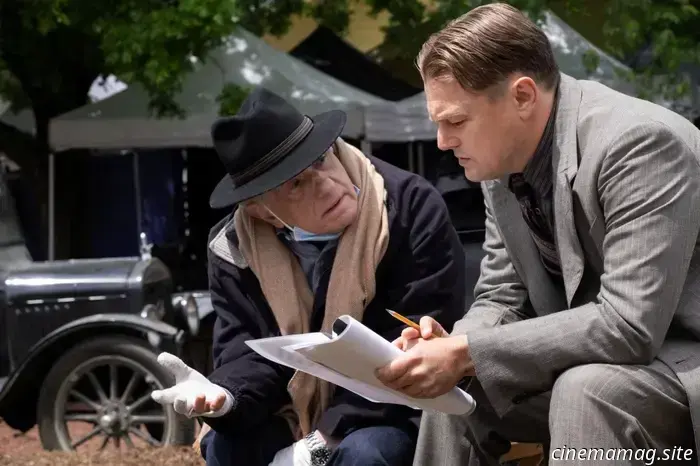-Movie-Review.jpg)
Poetic License (2025) - Film Review
**Poetic License, 2025.**
**Directed by Maude Apatow.**
**Starring Andrew Barth Feldman, Cooper Hoffman, Leslie Mann, Nico Parker, and Method Man.**
**SYNOPSIS:**
Sam and Ari, two inseparable best friends, begin to drift apart as they vie for the attention of Liz, a middle-aged mother who is auditing their college poetry workshop.
While Poetic License isn’t a standout film, it matches many average comedic movies available on streaming platforms. It reflects the blend of drama and humor that characterizes college life, yet seldom goes beyond its superficial appeal. As a first effort, it barely earns a passing grade.
The story follows two college classmates (Cooper Hoffman and Andrew Barth Feldman) whose friendship becomes strained when an older woman (Leslie Mann) joins their poetry class as an auditor. Scripted by Raffi Donatich with little flair or originality, the film lacks a compelling premise. The stakes are insufficient to create excitement, but the cast delivers solid performances, showcasing the director’s genuine affection for the material. Apatow occasionally hints at deeper themes—such as expectations in friendships and family relationships—although these elements feel somewhat cliched. The poetry sessions that tie the narrative together seem almost secondary.
Like many of Apatow’s films, this one serves as both a hangout movie and a coming-of-age story. It draws some parallels to Wes Anderson’s Rushmore, but my experience of watching it in theaters with a lively audience made it feel more engaging.
Hoffman stands out with a bold comedic flair that hasn’t been prominently displayed in Licorice Pizza or Saturday Night. There are moments that echo his late father Phillip Seymour Hoffman’s frenetic energy, and it’s enjoyable to see him displaying confidence instead of brooding. Nevertheless, his character, intended to drive the plot, lacks genuine conflict. In contrast, Feldman embodies restraint; similar to his role in No Hard Feelings, he becomes an effective scene partner, facilitating humor from others and infusing a lackluster character with enough life to be relevant. Their interactions may not provoke loud laughter, but they are often entertaining.
Leslie Mann adds her customary warmth, reminiscent of her performance in Funny People, bringing emotional authenticity and a touch of sensitivity to morally ambiguous roles. She enlivens every scene in which she appears, although her character, a former therapist who has surrendered her license, is poorly developed. The reasons for her decision are trivial when revealed. The film does tend to drag for about ten minutes too long, yet the chemistry among the cast keeps it engaging. Apatow wisely avoids her father’s trend of extending runtimes unnecessarily.
In the current age of social media, there’s an inherent skepticism when the offspring of a successful director releases their debut film featuring friends, especially when contemporaries are still searching for opportunities. Although it never feels as insulated as This Is 40 (in which her entire family appeared), Poetic License still utilizes characters’ inherited wealth and beneficial job placements as narrative shortcuts, bypassing potential financial tensions that could render their struggles more compelling.
When directing, every family portrait becomes a self-portrait. Method Man, portraying Mann’s mostly absent husband, emerges as the film's most authoritative character—well-connected, respected, and cherished by his family, even serving as Feldman’s professor. He appears to symbolize Judd Apatow. Meanwhile, Nico Parker’s role as the couple’s daughter is somewhat diminished, functioning like a stand-in for Apatow’s real-life sister Iris: younger, pursuing her path, and striving to distance herself from her mother. Despite their evident issues, the family remains supportive of one another and welcoming to outsiders—a quintessential Hollywood family.
Visually, the film exhibits moments of cleverness. Jocelyn Pierce’s costumes are among its most striking features, especially during a lawn fight where each character’s colors subtly signal passion, caution, or coolness. The outfits frequently serve as narrative devices, notably during a mustache-and-miniskirt party. Jeffrey Waldron’s camera captures humor simply by lingering on the actors’ expressions, with a slow zoom on Feldman during that party delivering the biggest laugh. These instances suggest that Apatow could evolve into a more daring, stylistically rich filmmaker if she embraced the visual storytelling seen in her work on Euphoria.
Apatow clearly inherits her father's blend of comedy and heart, and for the first time, Hoffman plays a role reminiscent of what his father might have portrayed, similar to Sandy Lyle in Along Came Polly if he were involved in Dead Poets Society. This combination is unconventional and not always fulfilling, yet the sincerity is evident.
In the end, Poetic License leans on charm rather than profound insights. It’s light and occasionally amusing—never deep—and could have presented bolder, more inventive storytelling. Nonetheless, for a nervous first-time filmmaker under familial expectations
-Movie-Review.jpg)
Other articles
 Martin Scorsese will direct Leonardo DiCaprio and Jennifer Lawrence in the film "What Happens at Night."
The 82-year-old Martin Scorsese recently disclosed that he has not yet decided on his next project, which could involve a crime thriller starring Dwayne Johnson, Home, The Devil in the White City, A Life of Jesus, a documentary on shipwrecks, or The Wager. Additionally, we have another project to consider for development. He has shown interest in a previously shelved Frank Sinatra project.
Martin Scorsese will direct Leonardo DiCaprio and Jennifer Lawrence in the film "What Happens at Night."
The 82-year-old Martin Scorsese recently disclosed that he has not yet decided on his next project, which could involve a crime thriller starring Dwayne Johnson, Home, The Devil in the White City, A Life of Jesus, a documentary on shipwrecks, or The Wager. Additionally, we have another project to consider for development. He has shown interest in a previously shelved Frank Sinatra project.
 Skynet places humanity on the naughty list with The Terminator: Santa Claus is Coming to Town.
This December, the Terminator franchise will embrace the holiday spirit as Dynamite Entertainment unveils a chilling portrayal of Christmas after Judgment Day with the one-shot special The Terminator: Santa Claus is Coming to Town. Humanity finds itself on the naughty list! In the ravaged, post-apocalyptic future ruled by Skynet, Christmas Eve is nowhere near [...]
Skynet places humanity on the naughty list with The Terminator: Santa Claus is Coming to Town.
This December, the Terminator franchise will embrace the holiday spirit as Dynamite Entertainment unveils a chilling portrayal of Christmas after Judgment Day with the one-shot special The Terminator: Santa Claus is Coming to Town. Humanity finds itself on the naughty list! In the ravaged, post-apocalyptic future ruled by Skynet, Christmas Eve is nowhere near [...]
Poetic License (2025) - Film Review
Poetic License, 2025. Directed by Maude Apatow. Featuring Andrew Barth Feldman, Cooper Hoffman, Leslie Mann, Nico Parker, and Method Man. SYNOPSIS: Sam and Ari, two close friends, begin to fall apart as they vie for the love of Liz, a middle-aged mother who is auditing their college poetry class. While Poetic License may not be an exceptional film, it is available on […]
